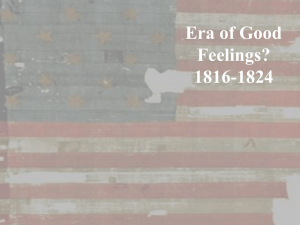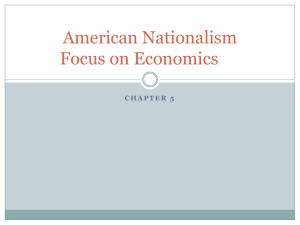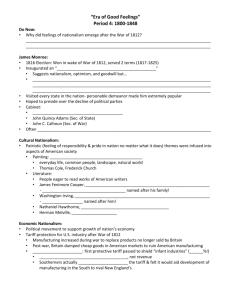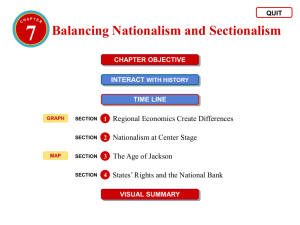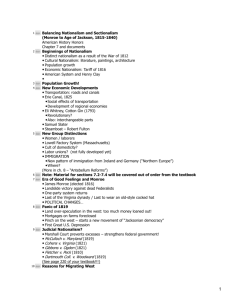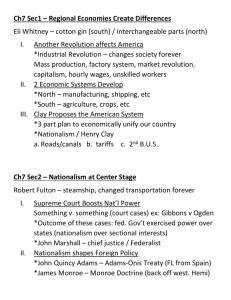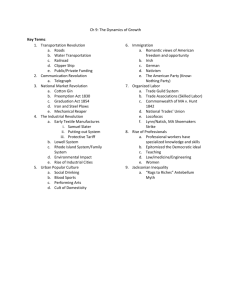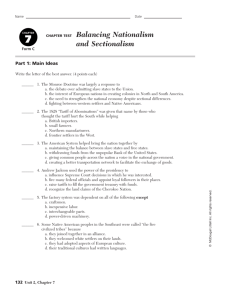American-History-Chapter-8-Review-Video
advertisement
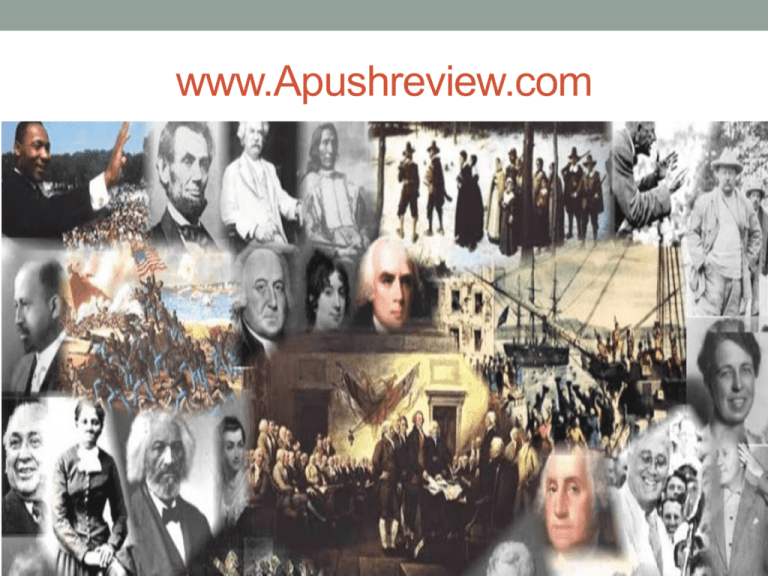
www.Apushreview.com AMERICAN HISTORY: CHAPTER 8 REVIEW VIDEO Varieties of American Nationalism Building a National Market • 1st Bank of US (BUS) expired in 1811 • State banks issued notes • 2nd BUS: • Charter for 20 years in 1816 • Francis Cabot Lowell: • 1st mill for spinning and weaving • Post War of 1812 Economic Problems: • Britain flooded the US market with goods • Hurt US economy • Need for tariff(s) • Tariff of 1816: • Designed to protect American industries • Protective tariff, not just a revenue tariff Building a National Market Cont. • Transportation improvements • Building of roads, canals, turnpikes, etc. • Question: who should fund, federal, or state government? • National Road: • Cumberland, Maryland to Wheeling, Virginia • Funded by federal government • Calhoun’s internal improvements bill: • Proposed for federal government to finance internal improvements • “Let us, then, bind republic together with a perfect system of roads and canals.” • Vetoed by Madison – believed Congress did not have authority to fund the project Expanding Westward • After War of 1812, many Americans moved westward • Fewer Native Americans, less threats • Huge increase in population • Need for more farmland out west • Cotton, like tobacco, exhausted land, was a large cash crop • Building of forts on the Mississippi River and Great Lakes • Erie Canal - 1825 • 1821, Mexico gains independence • US increases trade The “Era of Good Feelings” • What is it? • Huge increase in nationalism (Post-War of 1812) • 1 political party rule (Democratic-Republicans) • Attributed to Monroe’s Presidency, 1817 - 1825 • Election of 1816: • Continuing of the Virginia Dynasty • Rufus King (Federalist) received 34 electoral votes • Monroe chose JQA as his Secretary of State • Goodwill tour through the US • Florida: • Seminole War: • Invasion of Florida by Andrew Jackson • Adams-Onis Treaty of 1819: • US gained all of Florida in exchange for: • US gave up its claim to Texas • Spain gave up its claim to the Pacific NW The “Era of Good Feelings” Cont. • Financial Panic: • When in doubt, panics are caused by speculation (buying of a good in hopes of selling it at a higher price in the future) • Panic of 1819: • Overspeculation on land • The BUS began tightening its credit and calling in loans • Many state banks began to fail • As a result of this depression, many Americans blamed the BUS Sectionalism and Nationalism • MO Compromise: • MO (part of LA Purchase) applies for statehood as a slave state • This would make 12 slave states and 11 free • Tallmadge Amendment: • Proposed for gradual emancipation of slaves in MO • South hated it, seen as a step towards ending ALL slavery • The Solution? • MO added as a slave state • ME (from Massachusetts) added as a free state • Balance stays equal at 12 states free, 12 slave • Slavery prohibited above 36°30’ line in the future • Impact of MO Compromise? • Slavery would be the NUMBER 1 issue in national politics until the Civil War • Helped lead to an increase in sectionalism Sectionalism and Nationalism Cont. • John Marshall: • 4th Chief Justice • During his reign, the national government became more powerful, at the expense of states • Also, he helped improve the economy • Dartmouth College v. Woodward: • NH government tried to change the charter • Daniel Webster (great orator, future senator) argued the case • Marshall said a charter is a contract that could not be changed • Cohens v. Virginia: • Supreme Court can review state court decisions • Again, federal government gains more power at states expense Sectionalism and Nationalism Cont. • ***McCulloch v. Maryland*** (1819) • Background: Maryland hated the BUS, tried to tax it • Marshall and the court said the states could NOT tax a federal agency • “the power to tax is the power to destroy” • Essentially, the Supreme Court states the BUS is constitutional • ***Gibbons v. Ogden*** (1824) • Issue was with interstate trade (involving more than one state) • Stated that only Congress could regulate interstate trade • More power to federal government • Worcester v. Georgia (1832) • Stated Georgia could not interfere with Native land • Decision was not enforced, Natives were forced to leave Sectionalism and Nationalism Cont. The Monroe Doctrine • Written primarily by Secretary of State JQA • Essentially warned Europe to stay out of Latin America • US would consider any challenge as unfriendly • In return, the US would stay out of European affairs • Impacts: • Short-term? • Little to none • Long-term? • US would be the dominant power in the Western Hemisphere The Revival Opposition Wooohooo, I’m guaranteed to No? Too soon??? become the next president! • The “Corrupt Bargain”: • 4 candidates for the election of 1824 • None win an electoral majority, although Andrew Jackson has most electoral and popular votes • According to the 12th Amendment, the House would then decide on the top 3 candidates • Henry Clay (Speaker of the House), finished 4th and was out of the running • He threw his support behind JQA • Adams becomes president, Henry Clay becomes his Secretary of State • Clay’s American System: • Protective Tariffs, Internal Improvements, Bank of the US • Jackson and his supporters were outraged The Revival Opposition • Tariff of Abominations (1828): • Raised tariff rates drastically • Hated by South and West • Favored by manufacturers in NE • Election of 1828: • JQA v. Jackson round 2 • Jackson destroys Adams, 178 – 83 • Problems await Jackson……. That’s it! Subscribe to my channel Help spread the word • Questions? Comments? Ideas for videos? • Leave in comments My warning to Europe? Subscribe to Adam Norris!
